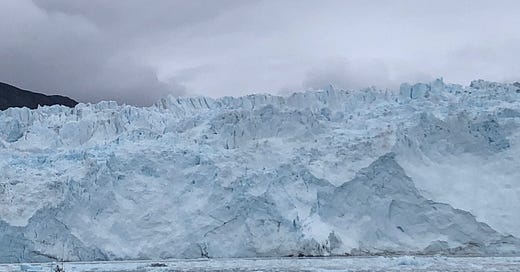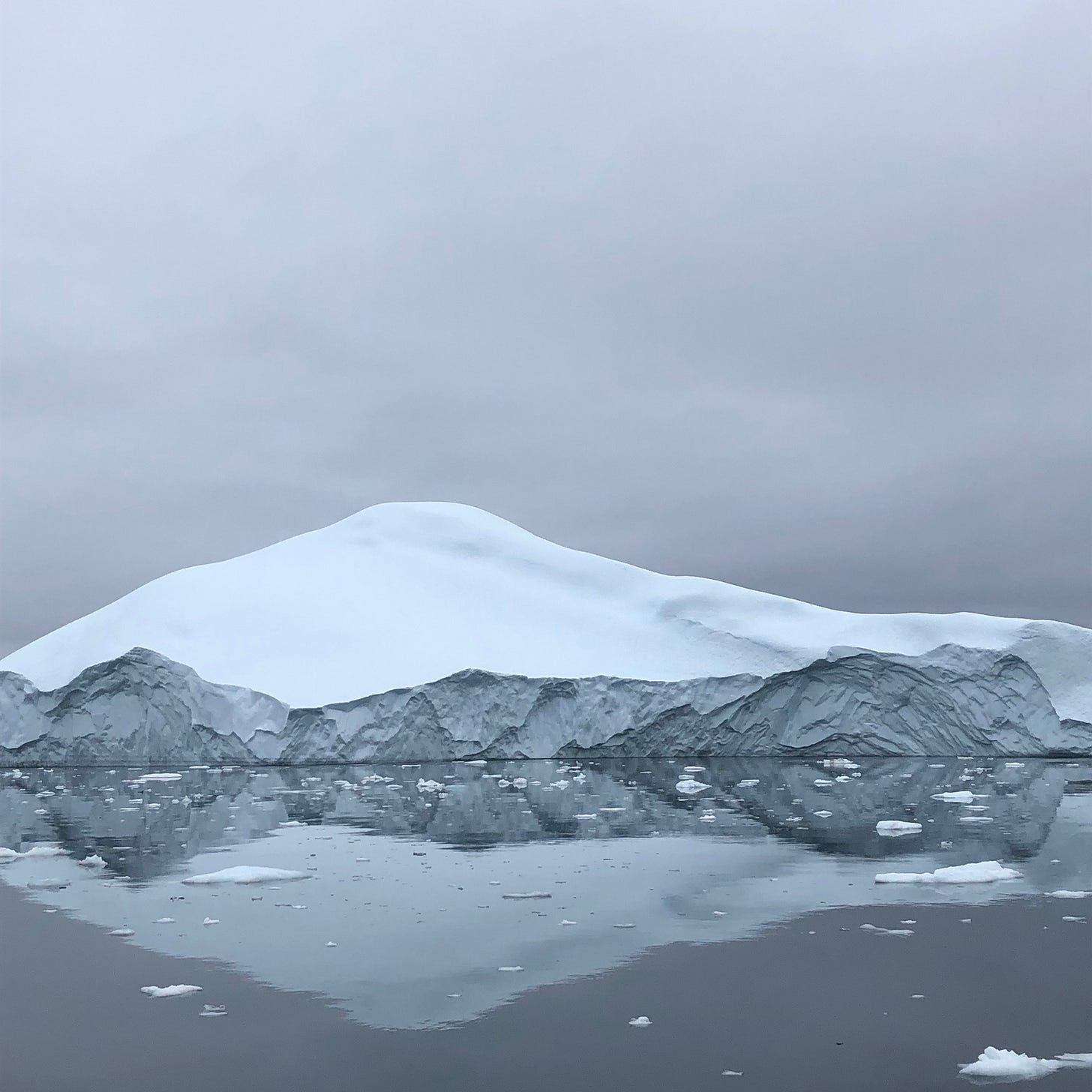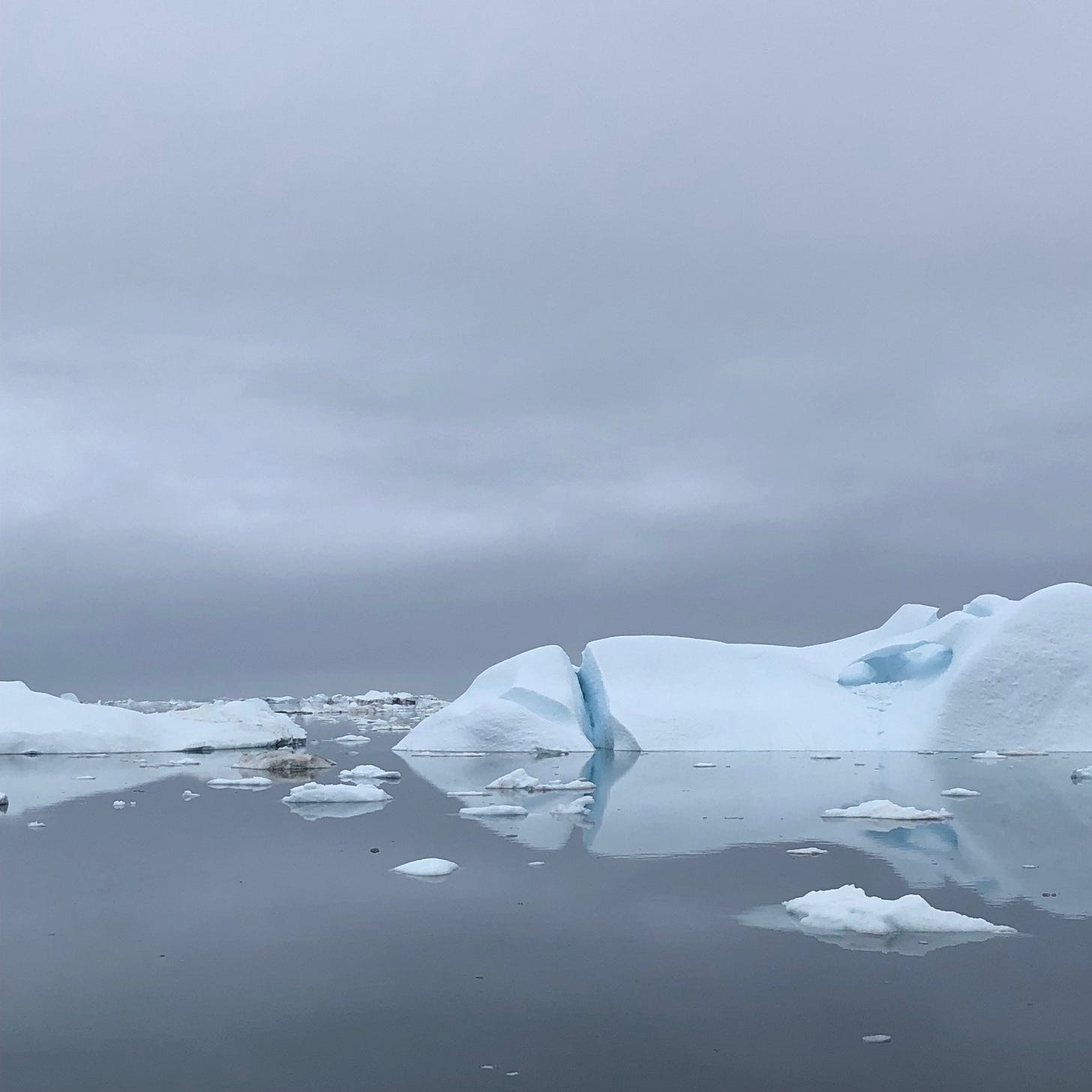Hi there,
It's been one of those weeks when things didn't go quite as expected. As a result, we've had to push back the story we were planning to publish and as a result of that, we're sending this issue out to everyone, even those of you who aren't subscribers yet.
It’s about Greenland. In part, that's because it's where I was, and, like the chef in this story, we all have to work with what we’ve got. Plus it gives me another excuse to spam you all with more iceberg porn.
But mostly it's because I had the extraordinary experience of spending a night alongside an active glacier that is rapidly receding due to climate change. Although Eqip Sermia is located far from what most of us consider civilization, with no internet or grocery stores or even roads within dozens and dozens of miles, it does have a restaurant. Which made me wonder: what is it like to be the chef there?
On another note, Lars B is off to other pastures and therefore leaves the editorial room for now. Other pastures being a position within the largest branch organization for the hospitality business in Denmark. That leaves me, Lisa A, to do the reporting and writing, which means now would be a really great time to help keep Bord floating along as buoyantly as any Greenlandic iceberg by subscribing.
Thanks for reading,
Lisa
It's been over two years since Game of Thrones ended, which should put us far beyond the reach of any Westeros-inspired metaphors, let alone the tortured one I'm about to make. But there is no better way to visualize Eqip Sermia than to think of the Wall. Like the daunting barrier that protected the seven kingdoms from the chaos to their north, it towers hundreds of meters high, and stretches kilometers wide. Its awe-inspiring face is comprised of icy cliffs, as chiseled as Jaime Lannister's jawline, and holds back a seemingly endless expanse of ice and snow. And like the Wall (Oops. Spoiler alert), Eqip Sermia is poised to disappear in the not unimaginable future. Located 80 kilometers to the north of the small city of Ilulissat, it is one of Greenland's most 'productive' glaciers, which means that it frequently throws chunks of itself into the frigid sea. This calving is normal glacier behavior--it's how icebergs are formed. But climate change has made the calving more frequent, so that it is the rare hour that goes by without a hunk of ice plummeting to the sea.
It's not the easiest place in the world to run a restaurant, yet that is exactly what Rune Christian Andersen is doing. As one of four chefs who rotate through the kitchen at Café Victor, the young Dane is in charge of feeding the travelers who journey three or four hour by sea to stay in the Eqi Lodge's huts on the glacier's edge. "We're so far away from everything that the guests come expecting dog food, I think," Andersen says. "So they're surprised to find they can buy a bottle of wine, and eat a nice meal."
Truth be told, Andersen is a little surprised to find himself there as well. After graduating from culinary school in Odense—he has the date, 13.06.2019, tattooed on his right forearm—and training in a restaurant there, he landed his first job working with the DFDS ferry line. But while he was on holiday in Bali, a call from a friend alerted him to a job in Kangerlussuaq, Greenland. And from there he got a job at the restaurant at the Hotel Icefjord in Ilulissat, which oversees Café Victor. He's currently on his second tour there, cooking breakfast, lunch, and a three-course dinner each night for as many as 40 guests at a time.
In some ways, it's like any other restaurant job (even on an Arctic glacier, it turns out, gluten intolerant guests expect their dietaries met). But the harsh environment and remote location makes everything much more complicated.
For one thing, the days are long. There are three guides on site along with the chef, and when they're not leading hikes, checking in guests, or repairing the ATV they use to haul crates of beer and laundry from the beach up the mountainside, they help with serving and washing up. But Andersen does all the cooking himself. He's up at 6 to fire up the generator and make breakfast for the guests, then cooks lunch for staff and the guests who stay behind, and after a 30-minute break, moves straight into dinner prep. Service is at 18.30, and by the time he's done cleaning up and making the lunch boxes for the following day, it's usually after 22.00. While he's at the camp (each rotation lasts 10 days or so), there are no days off.
There's also lot that can go wrong. Andersen places orders each day through the kitchen at the Hotel Icefjord, which are then packed and loaded onto the day's arriving boat, or at least that's the idea. Sometimes the boat's crew forgets to pick up the order. Sometimes ingredients arrive in a condition that God did not intend for them; when the heavy cream that Rune intended to use for Greenlandic coffee arrived frozen and unwhippable, he managed to make something resembling foam by beating warm whole milk with melted butte. And even when the order is picked up, and survives the perilous journey north, it's anyone's guess whether it'll contain what he actually requested. "It's more of a wish list than an order," he says. "Like today: I really wanted cauliflower. They sent celery."
He makes do. Andersen works mainly with Greenlandic ingredients: muskox, reindeer and lamb for meat; halibut, snow crab, and Arctic wolffish as seafood, and he changes the menu daily. (On the night I was there, it included a muskox tartare, hazelnut-crusted halibut, and blueberry panna cotta that would have held their own even if I weren't eating alongside an ancient mass of compacted ice located far from civilization). And he keeps the freezer well-stocked—root vegetable purées, bolognese sauce, bread rolls—in case of disaster.
His stovetop is gas, but the other appliances run on electricity derived from solar panels when it's sunny, and a backup generator when it's (frequently) not. If the generator breaks down, he and the rest of the crew have to fix it, or go without power. If ATV breaks down, as it did earlier in the summer, they have to haul all the supplies, including crates of wine--natural and otherwise— up the steep mountainside on their backs. If the water freezes (it flows through a pipe directly from a lake above the camp), as it often does, "I'm basically fucked," Andersen says. He keeps a large pot filled with water on the stove for coffee emergencies, but has to wait to do dishes until things thaw.
There is no television, no internet, and only a satellite phone for communicating with the outside world. For entertainment, the staff sometimes puts on music and dances around the kitchen. Although Andersen finds it intense to work and live so closely with others, he says the four get along with few conflicts. "We're really dependent on each other, and I'm pretty good at keeping down the anger," he says. "We don't have any choice but to find solutions out here, and getting angry doesn't solve anything."
And then there are the guests. Though most are thrilled to be at Eqi and appreciative of the team's hard work, some have their...quirks. One elderly man was apparently so displeased with having to leave his cabin to use the bathroom—some of the cabins share toilets with Café Victor— that he took a dump in a trashcan instead. A couple accidentally left behind the box of sex toys they had brought (as one does) to the glacier, then contacted the company to ask that it be returned.
Still, the biggest challenges come from nature itself. Even in summer, temperatures in the area rarely rise into the double digits. The mosquitos and black flies are fierce--the staff wears nets over their face whenever they're outdoors and Andersen keeps a video on his phone of one swarm so large it could star in a horror film.
All of it--the swarms and remote location, the finicky generator and frozen pipes, the unpredictable supply chain and occasionally washroom-challenged guests—has made Andersen more resilient and resourceful. "I think it's made me a better chef too," he says. "Because you learn to work with what you've got. But it's definitely put some hair on my chest."
Still, the looming glacier that fills his worktop window acts as a constant reminder that nature is the one in control here. When it calves, the release of compressed air makes a noise that can sounds like the low rumble of distant thunder or a massive explosion of dynamite next door. It happens at all hours, which is why the staff keeps a sign in their workroom that jokes: No Calving After 22.00. Please turn off the glacier before going to bed." Truth be told, however, Andersen kind of likes the sound. "Sometimes when I'm asleep, it reminds me of when I lived in Copenhagen with my mom. You know at the beginning of summer when the storms start? We would sit on our porch eating popcorn and listening to the thunder. When I hear it calving at night, that's what I think of."
Beneath the idyllic memory, there's a real threat to everyone who works at or even visits the glacier. If a large enough piece of ice calves from it, it can cause a tsunami when it hits the water. That hasn't happened in the time that the camp has existed, but on Andersen's first day, it came close. "There was a huge, huge calving," he says. "My friend Magnus was sitting in front of it in the boat, and when he tried to get away, one of the motors went out." The boat and its passengers survived but the waves were so huge, Andersen recalls, that they couldn't see the ship for a while.
But perhaps the most frightening thing he's witnessed is climate change's less dramatic but more dire effects. All glaciers advance and recede; usually shrinking a bit in summer thanks to the current and temperature, then growing again in winter. But Eqip, like many glaciers in Greenland, appears to be in permanent retreat. Over the last century, it has shrunk four kilometers, and in the past several years the rate at which it has receded has rapidly accelerated. All of that melt goes into the ever-rising sea. "Even now, when I go away for a few weeks and come back I can see that it has shrunk," Andersen says. "And they say that in ten or fifteen years, you won't be able to see it at all from here."
He's not sure how long he'll stay in Greenland. The isolation can get to him, but he also feels a twinge of stress every time he comes back into mobile phone range, and on a break in Copenhagen, he found himself slightly overwhelmed by all the people. Although he initially signed on to the Hotel Icefjord for just the season, he's already got plans to spend the coming winter working in Ilulissat--"in the dark and loneliness," he says with a smile that makes you think he's not entirely unhappy about it. And he's noticed how although many of his colleagues routinely insist that this is their last season, they keep coming back.
He thinks he understands why. "Every morning when I walk out of my hut, breathe the fresh air, and look at that glacier, I realize, yeah, this is Greenland," he says. "And then I go back to work."








What an experience! Loved it Lisa xx
beautiful, Lisa